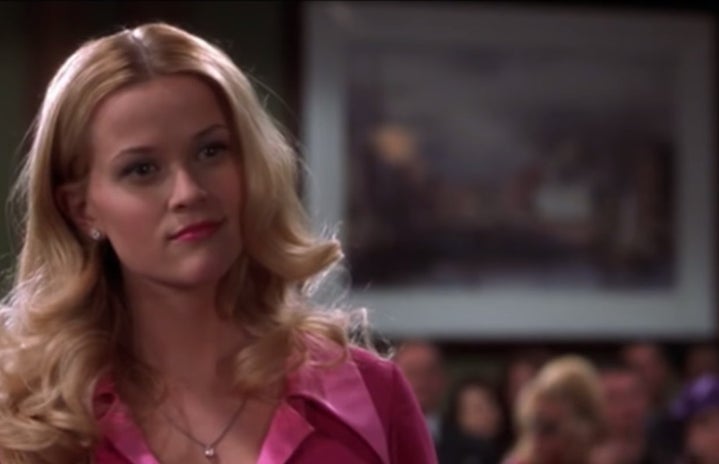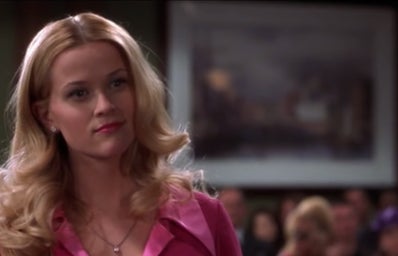The iconic 2000’s movie Legally Blonde is known for its killer cast, creative storyline, and incredible feminist message. The film stars Reese Witherspoon as Elle Woods–– a young woman in college, a seemingly ditzy and surface-deep blonde. She’s a fashion merchandising major, president of her sorority at the fictional university CULA, and is dating her longtime boyfriend Warner Huntington.
The film starts with Woods, eager and excited, thinking that Warner wants to propose to her, but is immediately thrown a curveball when he breaks up with her instead. He explains that he needs someone more “serious” as he’s planning on attending Harvard Law School following graduation. This prompts one of many memorable lines in the film as Witherspoon says, “You’re breaking up with me because I’m too… blonde?”
This revelation prompts Elle to focus on her studies, preparing for the LSATS, and creating her application to Harvard… after some well-deserved crying and chocolate post-breakup. Woods gets accepted and arrives at Harvard confident in herself and her ability to get her boyfriend back, but is met with harsh criticism from her professors and peers discouraging her. But she doesn’t let the surrounding judgement stop her from success and later proves that she has been underestimated. Her breakthrough moment comes at the end of the movie at the trial when she’s able to win a murder case and prove her knowledge of law and demonstrate the determination and intelligence she has had all along.
What sets Elle Woods apart from the other all-too-common “dumb blonde” tropes of the early 2000’s is the development of her self worth. She is originally depicted as a ditzy, “girly-girl” who was only accepted to the ivy league university because of her looks; but as the film progresses, we watch Woods understand that she is intelligent and hardworking, that she is worth more than a man who doesn’t appreciate her. And what separates her from other feminist characters from the 90’s/early 2000’s is that she doesn’t diminish her femininity in order to be smart; she embraces all aspects of her personality and uses it to her advantage.
Women are almost always put into boxes, categorized by one single trait that unfortunately defines them. And because of these categorizations women are constantly trying to fit into different aesthetics. For example, In 10 Things I Hate About You (1999), the Stratford sisters fall into two different categories: Bianca is girly and popular, while Kat is intelligent and a tomboy. Common tropes in the media often depict women having to choose between being smart and expressing their femininity because intelligence is often falsely associated with masculinity.
Meanwhile, these expectations are placed on Witherspoon’s character but she is able to prove them wrong. She completely shocks them by wearing pink and having a brain.
Another notable detail about the film is that it passes the Bechdel test. The Bechdel test is when a movie features two female characters who talk to each other about something other than a male. While this test might seem ridiculous, there is a wide array of movies that don’t pass. Although a notable part of the movie is her romantic interest, the real premise of it is not Elle finding a boyfriend but rather her finding her passion, pursuing a career, and learning to (as cheesy as it sounds) believe in herself.
Other movies since Legally Blonde‘s release that pass the Bechdel test are Mean Girls (2004), Pitch Perfect (2012) and To All The Boys I’ve Loved Before (2018), to name a few. Now in 2021, we are starting to see more progress for diversity on all fronts in the film industry. For example Greta Gerwig has become a widely accredited director of films such as LadyBird (2018) and Little Women (2019) and Mindy Kaling as a screenwriter for Legally Blonde 3, set to release May 2022. While Legally Blonde isn’t the most groundbreaking feminist film of all time, it is able to set a precedent for films that rather than use feminity as a punchline, realize it is important to break traditional character tropes and exemplify women as the multifaceted beings they are.

